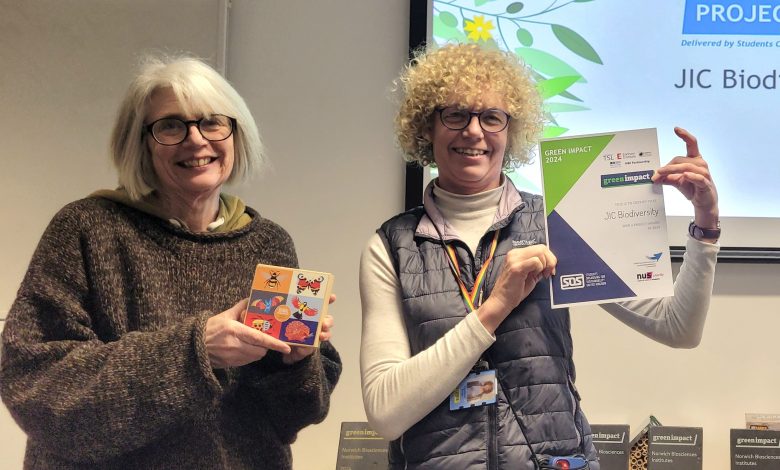Green Impact Awards 2025 – making science greener in Norwich

The pursuit of scientific progress is a crucial aspect of advancing society, but it comes with a significant environmental cost. Laboratories, in particular, are notorious for their high energy consumption and waste generation, accounting for around 2% of global plastic waste and using 3-10 times more energy per square meter than a typical office. However, there is a growing recognition of the need for sustainable practices in scientific research, and institutions are starting to take action. The John Innes Centre (JIC) and its partners, for instance, have been participating in the Green Impact scheme, an international sustainability initiative that encourages teams of staff and students to work towards reducing their environmental footprint.
The Green Impact scheme has been a resounding success, with the number of participating teams and sustainability actions increasing significantly over the past three years. From just two teams with 129 actions in the inaugural year, the scheme has grown to include eight teams with 478 actions. This year, new teams from the JIC’s Horticultural Services and ‘Building 26’ joined the scheme, alongside students from the Norwich Bioscience Institutes (NBI). The scheme has facilitated a range of innovative sustainability efforts, from reducing energy consumption and waste to promoting biodiversity and conservation. For example, the Biodiversity Project team at the JIC focused on recording and promoting biodiversity on site, while the Chatt Building team introduced a traffic light sticker system to encourage lab users to switch off equipment.
One of the standout features of the Green Impact scheme is its ability to bring people together to work towards a common goal. The scheme has encouraged collaboration and knowledge-sharing between teams and departments, with participants learning from each other’s experiences and best practices. For instance, the Sainsbury Laboratory has been using a pipette tip washer to reduce single-use lab plastics, saving 5L of water and 1.8 kg of CO2 per tip rack. Meanwhile, the Earlham Institute participated in the ‘Freezer Challenge’, replacing inefficient freezer units with eco-friendly versions and clearing out over 700,000 old samples, resulting in a significant reduction in energy consumption. These efforts demonstrate that small actions, when taken collectively, can have a significant impact on reducing waste and promoting sustainability.
The success of the Green Impact scheme is not just about the numbers; it’s also about the people who have made a positive impact through their passion and dedication. This year, several individuals were recognized for their outstanding contributions to sustainability, including Kes Maio, a PhD student at the JIC, who won the Student Leadership Award for founding a sustainability team and designing posters to promote energy and water saving. Caroline Smith, a community engagement officer at the JIC, won the Community Action Award for her work engaging students in environmental issues and promoting soil health and biodiversity. These award winners, along with many others, have demonstrated that individual actions can make a real difference in promoting sustainability and reducing waste.
As the NBI looks to the future, it is set to participate in a new scheme, LEAF (Laboratory Efficiency Assessment Framework), which aims to promote laboratory efficiency and sustainability. The scheme, led by University College London, will provide a framework for laboratories to assess and improve their environmental performance. The NBI is keen to share its experiences and learn from others, and is encouraging others to get in touch to share their innovative ways to make science more sustainable. By working together and sharing knowledge, we can create a more sustainable future for scientific research and reduce the environmental impact of laboratories.
The Green Impact scheme has shown that even small actions can add up to make a significant difference in promoting sustainability and reducing waste. As Ethne Clark, Energy and Environment Officer at NBI, notes, “The science across our sites aims to improve the environment and people’s health, so it is great to see that we also live and breathe this mission in the day-to-day running of our site.” By recognizing and celebrating the achievements of individuals and teams, we can inspire others to take action and create a wave of positive change. As the NBI and its partners look to the future, they are committed to continuing their efforts to reduce their environmental footprint and promote sustainable practices, and they invite others to join them on this journey towards a more sustainable future.








